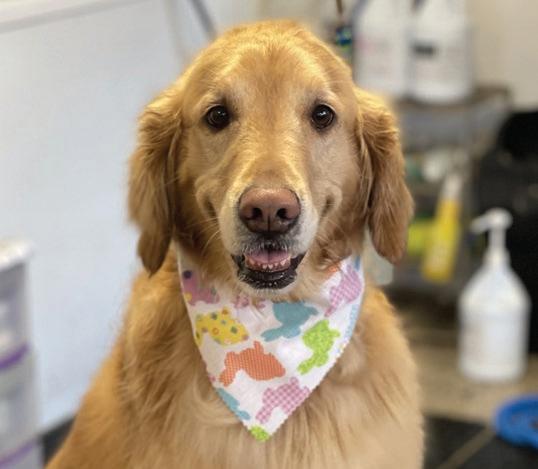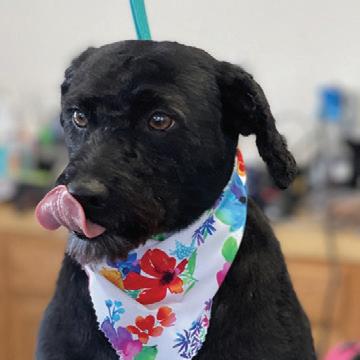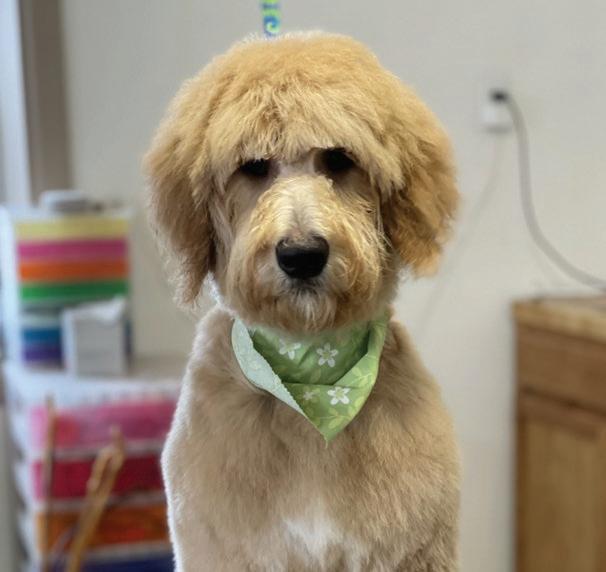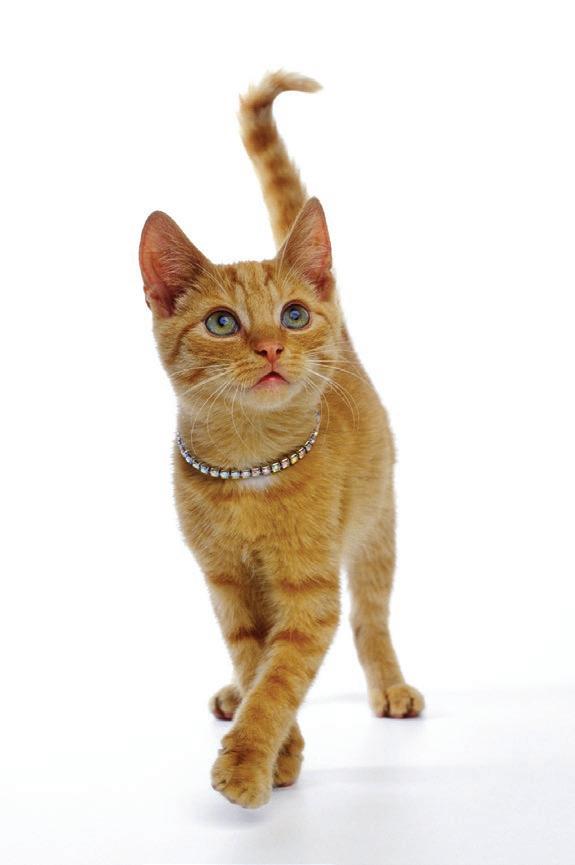P ET O F T H E YEAR

Lyme disease is very prevalent in our area, and is preventable through vaccination.


Is your dog vaccinated?




Call for an appointment.
Since our rescue has begun we have taken in hundreds of cats and dogs. Through the years many of them were fortunate enough to find their forever home, however every year we have several that have not. All of the animals will always have a place with us as we are a no kill rescue. We are asking our community for help to find these loving cats and dogs a forever home. If your home and heart has room and you’re considering adopting a new pet, please consider one of our many rescues.


2—Lewistown, PA Wednesday, April 19, 2023 The Sentinel Big Valley Animal Hospital 101 Three Cent Lane, Reedsville, PA 17084 Mon-Fri 8:00am to 5:00pm Sat 8:00am to 11:00am ~ Routine vaccinations & exams, soft tissue surgery, orthopedic surgery & dental procedures. ~ Check out our online store through our website * Huge discount on stray cats spay & neuter Sponsored by Big Valley Animal Hospital ROFF is always in need of dishes, leashes, collars, food, treats & toys.
717-667-2000 bigvalleyanimalhospital.com
2 Year Old Miniature
Butchie




5 Month Old Miniature




12 Year Old Miniature




7
15
Almost
Year
Wednesday, April 19, 2023 Lewistown, PA—3 The Sentinel
#1
#4
#7
#10
#5
#8
#11
#6
#9
#12
#2 #3
Abby
Dachshund
Becky Wagner & Jimmy Wray
Dachshund
Becky Wagner & Jimmy Wray
Emmitt
Dachshund
Becky Wagner & Jimmy Wray
Henry
Year Old Dachshund
Becky Wagner & Jimmy Wray
Molly
Year Old Dachshund
Becky Wagner & Jimmy Wray
Abby
1 Year Old 80’s Hair Band Doodle
Randy & Terri Hide
Bailey
1 Year Old Black Lab
Seth & Nicole Lewis
Bella Avery
7 Year Old Shih-Tzu
Helen Condron
Isabeau (Izzy) Luna
1 Year Old Shih-Tzu
Helen Condron Buffy
4 Year Old Jug
Mike & Amy Snook
Buford 1 Year Old Jug
Mike & Amy Snook
Charcoal
3
Old Mixed Breed
Michelle Bitner
‘Popcorn paws’ is a common condition affecting pets

The joy that companion animals bring into a household is what compels millions of people to adopt, purchase or foster pets. Pet ownership requires doing what is necessary to keep the animal content and healthy.
Recognizing various common health conditions that can turn up in pets is one component of responsible pet ownership. Popcorn paws is a common yet lesser known condition that affects popular house pets like cats and dogs.

What is popcorn paws?
Popcorn paws, sometimes called Frito® feet,
is often discovered when pet owners are tending to their dogs and cats. The condition is so named because pet owners often notice their animals’ paws smell of popcorn or corn chips. That odor is a byproduct of bacteria.
Billions of microorganisms are teeming on the skin of pets like dogs and cats. According to the staff at Oakhurst Veterinary Hospital in New Jersey, popcorn paws occurs when bacteria called pseudomonas and proteus mix with sweat and other moisture on the paws of pets’ feet. Coupled with microbes on the pet’s tongue, which the animal
will likely use to clean areas of its body, including the paws, these microbes grow and give off a yeasty odor that some have likened to the smell of popcorn or corn chips. Dogs in particular have an abundance of sweat glands in their feet. Furthermore, the area between the pads on their paws is moist and dark, which makes this area ripe for the overgrowth of bacteria and yeasts. Even though these microbes are naturally occurring, an overwhelming smell may indicate they’ve proliferated out of control.
cerned?
Minor yeasty aromas may be nothing to worry about, and keeping pets’ paws clean and dry may help clear up the issue. Long fur on the paws and in between the pads of the feet should be trimmed to curb odor and reduce the accumulation of debris and dirt in these areas. Various hygienic measures can help the matter. The dog health and lifestyle experts at Dogster. com say that if the smell is quite foul, or the pet is consistently licking its feet or having trouble walking, the situation may be more serious. An injury or yeast infection
could be at play. It’s always best to err on the side of caution and discuss symptoms with a veterinarian. The doctor may suggest certain measures, including changing diet and altering hygiene routines. This is a safer bet than homeopathic

treatments or strategies touted on medically unsanctioned websites.

Popcorn paws could be making pets a little more smelly than they need to be. Thankfully, getting on top of this health condition is relatively simple. www.lewistownsentinel.com
When should I be con-
PET OF THE YEAR 4—Lewistown, PA Wednesday, April 19, 2023 The Sentinel PET FOOD & SUPPLIES Always Quality Feed 141 Three Cent Lane, Reedsville 717-667-6556 Frequent Purchase Program ★Pet Food★ Buy 8 Bags Get 1 FREE












Wednesday, April 19, 2023 Lewistown, PA—5 The Sentinel #13 #16 #19 #22 #17 #20 #23 #18 #21 #24 #14 #15 Calico Kauffman 1 1/2 Year Domestic Longhair Tena & John Kauffman Catalena Sophia 5 Year Old Sealpoint Siamese Tena & John Kauffman Leonardo Antonio 5 Year Old Sealpoint Siamese Tena & John Kauffman Sally Magally 11 Year Old Doemstic Shorthair Tena & John Kauffman Cooper 3 Years Old Rich & Heidi Goodwin Daisy 2 Years Old Beagle Bill & Sandy Gomes Daphne 9 Month Old Grey Tiger Jada Renninger Dzus 8 Year Old Pembroke Welsh Corgi Karen Frontz Gracie 5 Year Old Beagle Lori Wilson Harper 9 Month Old Jack Russell Terrier Stephanie Clouser Jada 6 Week Old German Shorthaired Pointer Kevin & Sue Kibe Van 9 Month Old Vizsla Kevin & Sue Kibe
Forrest In Loving Memory
Australian Cattle Dog/Beagle

The Marks Family
Pugsly
16 Years, 4 Months Puggle

Joshua Marks
Skye
8 Year Old Yellow Lab

Sandy In Loving Memory Boxer/Lab



Joshua Marks
Sheba
17 Years Old



5 Year Old Longhair
Lila
7 Year Old Chihuahua

Linda Chester
Simba

15 Week Old Golden Retriever/Lab

Wilhamenia Stull
16
Year Old
10 Year Old
6—Lewistown, PA Wednesday, April 19, 2023 The Sentinel
#25
#28
#31
#34
#29
#32
#35
#30
#33
#36
#26 #27
Becky & Rodney Marks Jr.
The Marks Family
Sven
Joshua Marks
Oreo
2
Shorthaired Tuxedo Cat
Melody Daer
Ray Ray
Michelle Bitner
Sir Frankie
Week Old Pembroke Welsh Corgi
Richard Walters
Sullivan
Boxmas
Mark & Nikki Hidlay
Sponsored by Big Valley Animal Hospital


All of our Cats are tested for Feline Leukemia and FIV. They are Spayed and/or Neutered as well as litter trained.





Donations are always appreciated. We are always in need of food, litter, litter boxes, scooper, dishes, bed and toys.
VISIT the website to see all the available animals for adoption www.roffrescue.com or call 1-877-933-ROFF (7633)




Wednesday, April 19, 2023 Lewistown, PA—7 The Sentinel
Cashew Josie
Aggie
Patsy
Wilson
Sweetie
13 Year Old Poodle


Sweetie
8 Year Old Dachshund Todd Sunderland

Tiny
6 Year Old Domestic Shorthair

Winston
20 Month Old Labradoodle

11 Month Old Mini Bernedoodle
4 Year Old
The dangers of letting cats roam outdoors
House cats make peculiar, interesting and lovable companions. Cat owners often go to great lengths to make their furry feline friends feel good, and some may allow cats to roam outside. Though such a decision may be well-intentioned, it could lead to some troubling consequences.
The animal welfare or-

ganization American Humane notes that allowing indoor cats outside could jeopardize their health and safety in a number of ways.
Health
Cats allowed to venture outside may encounter feral cats, which American Humane notes can be carriers of disease. A
2014 study published in the journal Zoonoses and Public Health estimated that between 60 and 100 million feral cats live in the United States, and that figure could be even higher today. The animal rights organization PETA notes that contagious diseases such as herpes viral conjunctivitis, feline AIDS, leukemia, and infectious peritonitis are common in feral cats.
Indoor and outdoor cats who catch these diseases could suffer serious consequences, including death.

Infection with parasites is another potential
outcome for indoor cats allowed outdoors. Though American Humane notes parasites are not usually life-threatening for cats, they can cause a multitude of symptoms, including scratching, skin infections, vomiting, and diarrhea. Fleas, ticks, ear mites, gastrointestinal worms, and ringworm, which can be passed on to people in certain situations, are just some of the parasites cats can pick up if allowed outside.
Safety
Safety is another factor cat owners must consider as they ponder wheth-

er or not to let their cats outside. American Human disputes the notion that cats have an innate instinct to avoid busy streets. Reliable estimates regarding how many cats are struck and killed by cars each year are hard to come by, but it bears noting that cats’ small stature makes them hard for motorists to see, which could make them more vulnerable to being hit by cars than dogs. Vehicles are not the only outdoor safety threat to cats. Loose dogs and wild animals, including raccoons and foxes, may hunt cats allowed out-
doors. Cats also could ingest toxins such as antifreeze, which has a pleasant taste but could prove fatal for cats. And though the image of firefighters saving cats from high perches in trees is common, trees are a significant threat to cat safety. Curious cats may climb trees and then be afraid to come down or struggle to come down safely, potentially leading to severe injuries.
Though owners may allow cats outdoors as an act of kindness, such a decision could place these pets in serious jeopardy.
8—Lewistown, PA Wednesday, April 19, 2023 The Sentinel
#38
#41
#42 #43
#39 #40
Todd Sunderland & Nichole Welch
& Nichole Welch
Norma Imes
Wendell Morgan
Zoey
Kim Eckley
Zuma
Pitbull/ Labrador Mix Heath Hidlay
Just a Click Away! WWW.LEWISTOWNSENTINEL.COM The Sentinel

Wednesday, April 19, 2023 Lewistown, PA—9 The Sentinel



10—Lewistown, PA Wednesday, April 19, 2023 The Sentinel Pet Accessories • Food & Supplements • Treats And SO Much More! We strive to ensure that the products we sell are made in the USA! Be sure to stop in and bring your furry friend. GREAT QUALITY • GREAT SERVICE! 4477 E. Main Street Belleville, PA 17004 Hours: Mon.-Fri. 9AM - 5PM • Sat. 9AM - 1PM – FROM THE PERFECT SNACK TO THE PERFECT BED! –WE HAVE IT ALL
How to recognize vision loss in dogs
Sometimes it is challenging to realize a pet dog is losing its vision. That’s because, unlike humans, dogs do not rely on sight as readily as other senses, like hearing and smell. A pup who is slowly going blind might be able to navigate quite well, as the other senses enable the dog to adapt to changes in eyesight, advises the American Kennel Club.
Pet parents who are concerned their dogs may be losing their vision can learn the risk factors for vision loss and keep an eye out for potential signs that such loss is present.
Breed risk
Certain breeds are at higher risk for health
issues that can lead to vision loss. For example, cataracts are the leading cause of blindness in Cocker Spaniels, says HandicappedPets.com. Both Golden Retrievers and Labrador Retrievers are genetically predisposed to progressive retinal atrophy (PRA), which can cause blindness. Due to recessive genes, Siberian huskies can be susceptible to eye issues, including corneal dystrophy. Boston terriers may develop cherry eye, a condition caused by a prolapsed eyelid.
Pet owners should speak with their veterinarians to learn if their dogs have a genetic predisposition to eye diseases and conditions that
may lead to blindness.
Conditions that cause blindness
Dogs who have had a cataract, which is a clouding of the eye that stops light from reaching the
retina, may slowly lose their vision. Diabetes also can cause full or partial blindness. Glaucoma, PRA and sudden acquired retinal degeneration syndrome (SARDS) all can lead to blindness in
one or both eyes. If dogs have been diagnosed with these issues, it’s best to work with a vet to carefully monitor and/or treat them, if possible.
Signs of diminished eyesight
Vision deterioration can produce certain signs, including:
• Cloudy appearance of the eye or eyes.
• Improper pupil response to light and darkness.
• Difficulty focusing on items or people’s faces. Some dogs may have to come much closer to recognize a person’s features.
• The dog seems dazed and confused, or gets surprised by someone suddenly when entering a
room.
• Hesitancy running or moving around, or changes in mobility. The dog may no longer want to go up and down stairs.
• Difficulty finding the food bowl, as well as weight loss from not eating.
• Behavioral changes, such as acting more anxious, sullen or even scared.
Vision loss can occur in dogs, particularly aging canines. Pet owners can be attuned to signs of diminishing vision and take steps to help their furry friends.
What to know about feline diabetes
No pet owner wants to imagine their furry friend falling victim to illness, but companion animals are not impervious to disease. In fact, various ailments typically associated with humans can affect pets as well.

Diabetes is one condition that cat owners may want to learn about.
According to the Cornell Feline Health Center, between 0.2 and 1 percent
of cats will be diagnosed with diabetes during their lifetime. Though that’s a small percentage, cat owners can still make an effort to understand feline diabetes so they can spot its signs and help their cats avoid any potential risk factors for the disease.

What is feline diabetes?
Much like their human
owners, cats need sugar (glucose) for energy. Glucose in the blood needs insulin, which is a hormone the pancreas produces. The CFHC notes that insulin is used to “unlock” the door to cells. Insulin attaches to cells and indicates the right time to absorb glucose, which is used as fuel and leads to lower glucose levels in the blood. Type 1 diabetes occurs when insulin production is insufficient, leading to high concentrations of glucose in the blood. Type 2 diabetes occurs when glucose levels are elevated because the body’s cells are not responding appropriately to insulin. The CFHC reports that, in the case of both type 1 and type 2 diabetes, cells cannot access the nutrients they need because insulin cannot transport the sugar from
the bloodstream into the cells that need it.
What are the risk factors for feline diabetes?
Some of the risk factors for diabetes in humans affect cats’ risk for the disease as well. For example, obesity and physical activity are two risk factors for feline diabetes. Being obese and living a sedentary lifestyle increases humans’ risk for diabetes as well. The link between obesity and feline diabetes is so significant that the CFHC indicates obese cats are up to four times more likely to develop diabetes than ideal weight cats.
But those are not the only two risk factors for feline diabetes. The CFHC notes that the use of glucocorticoids, a type of steroid sometimes used to
treat feline asthma, could increase the risk for feline diabetes. In addition, PetMD reports that certain breeds of cats have been found to get diabetes more than others, which indicates that genetics could play a role as well.
What are some symptoms of feline diabetes?
Weight loss and increased thirst and urination are two of the more common signs of feline diabetes reported by cat owners. The weight loss occurs even when cats exhibit a strong appetite. Though the CFHC indicates this is rare, in some instances cats with feline diabetes may experience nerve damage in the hind limbs. Though this isn’t painful, it may compel cats to walk or stand with their hocks on or close the ground.
Can feline diabetes be treated?
The good news regarding feline diabetes is that the prognosis is good when the right steps are taken to manage the condition at home. A veterinarian may recommend a combination of insulin therapy and dietary changes. Insulin therapy typically involves insulin injections, but the CFHC notes that syringe sizes are typically so small that cats tolerate the injections quite well.
Feline diabetes may be something cat owners have never considered. The condition can affect any cat, and learning its ins and outs can ensure cat owners know how to respond if cats begin to exhibit symptoms of the disease.
Wednesday, April 19, 2023 Lewistown, PA—11 The Sentinel PET OF THE YEAR























































12—Lewistown, PA Wednesday, April 19, 2023 The Sentinel Now offering Thera-Clean Microbubble Baths BIG OR SMALL, WE GROOM THEM ALL. NO BREED DISCRIMINATION. www.flickingerspawsandclaws.com 717-636-9783 31 South 2nd Street 717-275-4904 1274 William Penn Hwy Right off the Arch Rock Exit of 322 Evening Appts: Friday NEWPORT Open 7 Days MIFFLINTOWN Open Mon-Sat Charles Kimmel (Certified Dog and Cat Groomer at Newport Location) Kaitlyn Eaton (Certified Dog & Cat Groomer at Newport) Rebecca Fox-Groomer (Groomer at Mifflintown) Sara Flickinger Certified Canine Esthetician • AKC Safety Certified Pet Groomer Owner LLC Your Pet TheDeserves Best! Providing safe, natural, made in the USA pet retail products. “The Bone & Raw Bar”Doggy Fro Yo Bakery & Other Yummy Treats CatsAccepting & Dogs at both locations!

























































































































